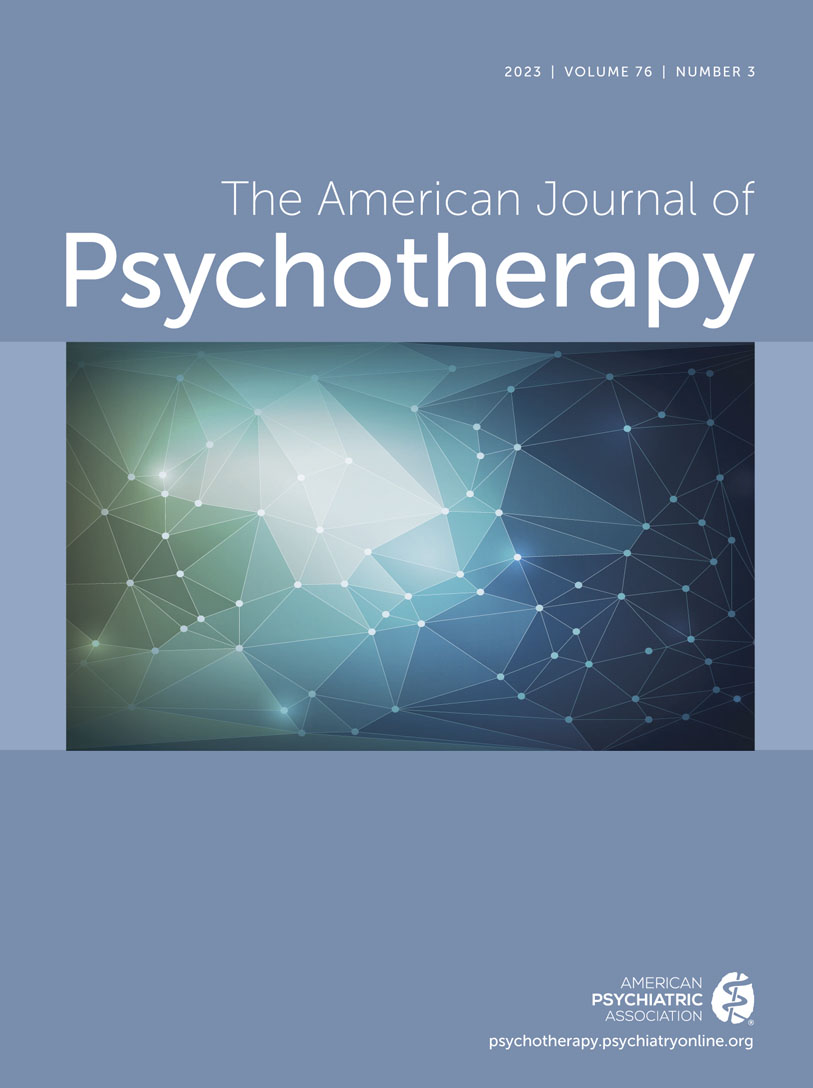American Journal of Psychotherapy
- Volume 57
- Number 3
- July 2003
Articles
Publication date: 01 July 2003
Pages287–299In analytic psychotherapy, language provides form for the patient’s conscious and unconscious material. Therefore, language creates a space for patient expression and a medium for therapeutic work. The space of language in analytic therapy is comparable ...
https://doi.org/10.1176/appi.psychotherapy.2003.57.3.287Publication date: 01 July 2003
Pages300–323Since Freud’s time, psychoanalytically oriented therapists have been wary accepting gifts from patients, and have also been reluctant to give them to patients. This article first provides a literal definition of the word “gift,” and then defines it within ...
https://doi.org/10.1176/appi.psychotherapy.2003.57.3.300Publication date: 01 July 2003
Pages324–336Objective: To assess if eight counseling sessions conducted by women minimally trained as community counselors could reduce the mean level of anxiety and/or depression in women of their own community. Design: A randomized controlled trial. Setting: A ...
https://doi.org/10.1176/appi.psychotherapy.2003.57.3.324Publication date: 01 July 2003
Pages337–347The Personal-Story Approach presented here instructs psychotherapy clients how to listen intelligently and courageously to their own accounts of the events and experiences of their lives, as well as how to listen carefully and compassionately to those ...
https://doi.org/10.1176/appi.psychotherapy.2003.57.3.337Publication date: 01 July 2003
Pages348–360Conducting clinical interventions in a research setting poses numerous challenges to clinicians, researchers, supervisors, and research participants. These issues often reflect a tension between the rigorous demands of a research protocol needed to ensure ...
https://doi.org/10.1176/appi.psychotherapy.2003.57.3.348Publication date: 01 July 2003
Pages361–373Former political prisoners in Chile gave testimony of their traumatic experiences, which resulted in diminishing their posttraumatic symptoms. Based on this experience, testimony therapy has been developed and used in treatment of traumatized victims of ...
https://doi.org/10.1176/appi.psychotherapy.2003.57.3.361Publication date: 01 July 2003
Pages374–383Background: To date, all clinical trials using a single therapeutic modality (psychotherapy or pharmacotherapy) have found that even the best validated treatments for adults with chronic Posttraumatic Stress Disorder (PTSD) leave a substantial proportion ...
https://doi.org/10.1176/appi.psychotherapy.2003.57.3.374Publication date: 01 July 2003
Pages384–400Forensic experts agree that the doctrine of informed consent now applies to psychotherapy. The optimum level of detail and content in this interaction remains nebulous. This study examines opinions and practices of therapists. The authors administered a ...
https://doi.org/10.1176/appi.psychotherapy.2003.57.3.384Publication date: 01 July 2003
Pages401–413Scientific theories that are concerned with experience and behavior of human beings always include anthropological core assumptions. This applies in particular to psychotherapeutic theories. These anthropological core assumptions (i.e., concepts of ...
https://doi.org/10.1176/appi.psychotherapy.2003.57.3.401Book Review
Past Issues
View Issues Archive
Vol. 77 | No. 2

Vol. 77 | No. 1

Vol. 76 | No. 4
